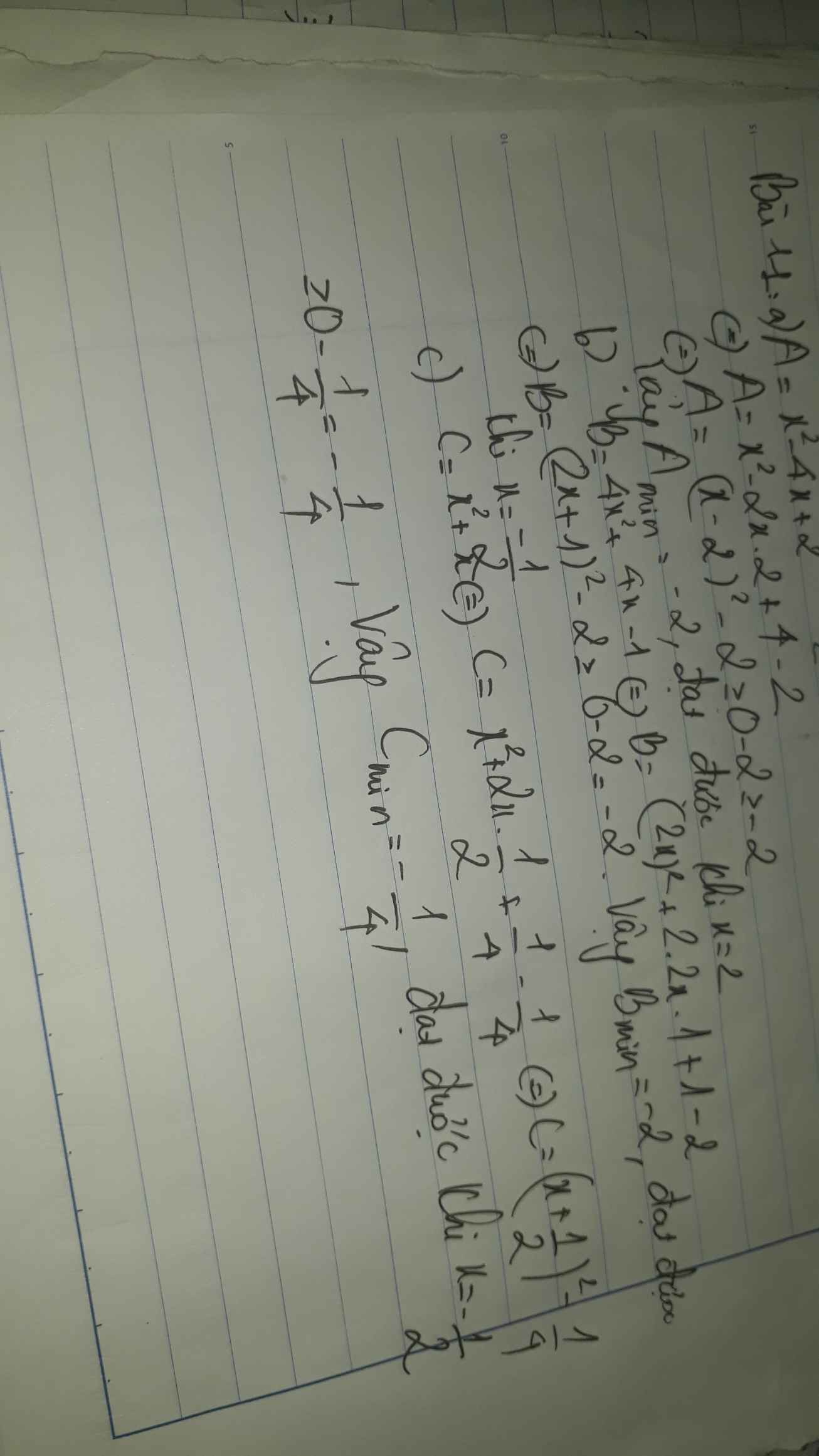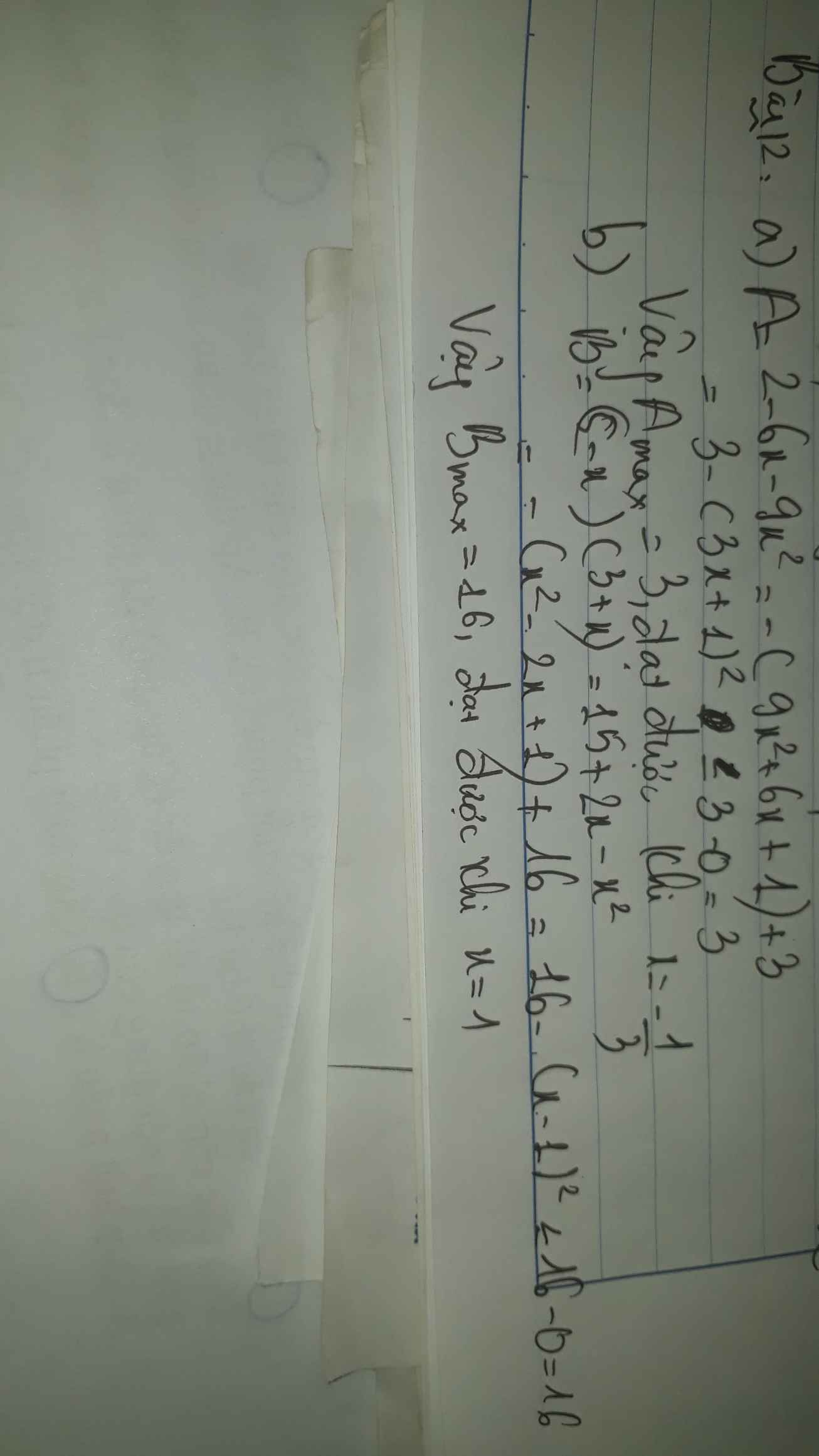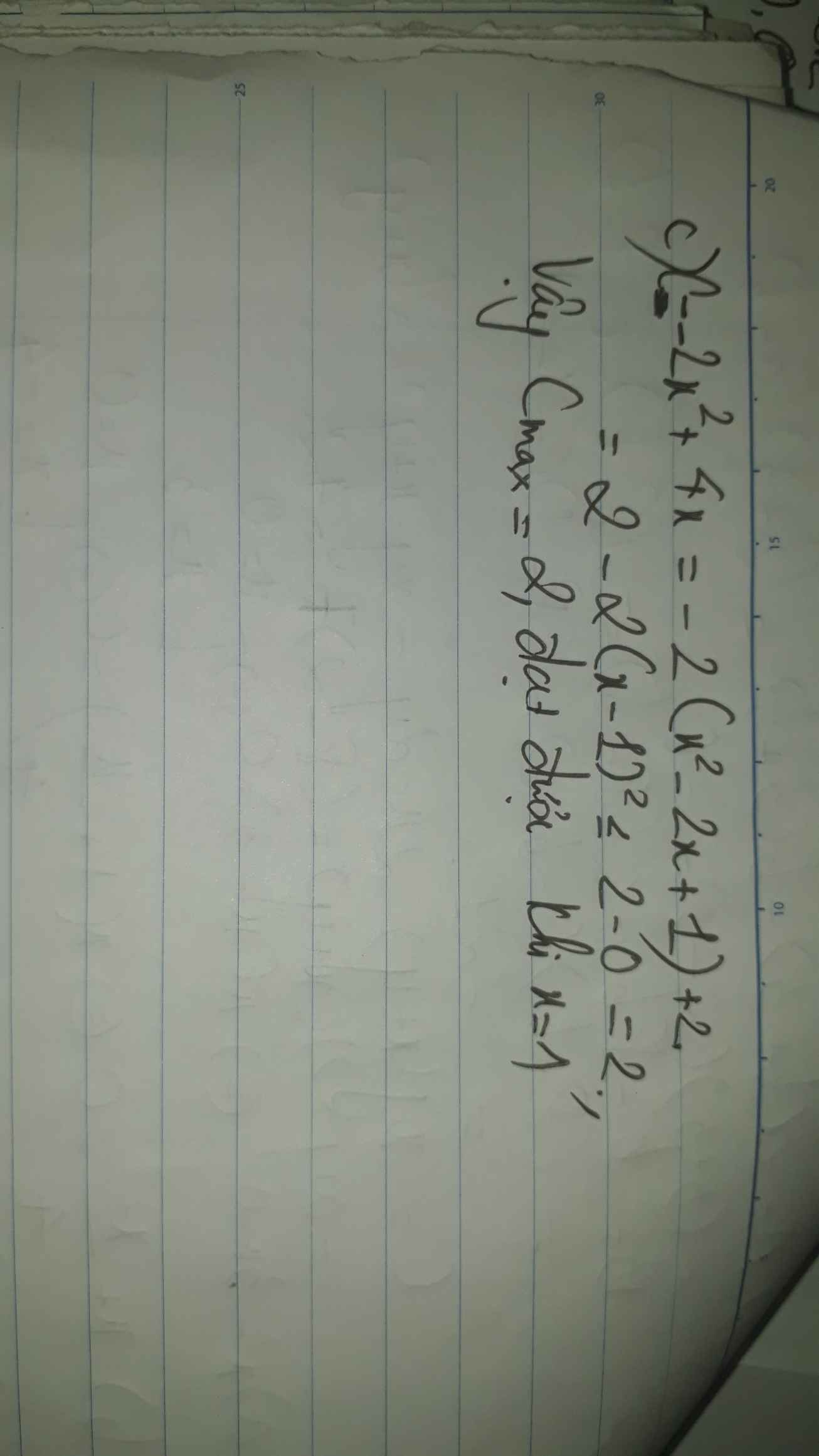
Hãy nhập câu hỏi của bạn vào đây, nếu là tài khoản VIP, bạn sẽ được ưu tiên trả lời.


\(A=4x^2-12x+11\)
\(A=\left(2x\right)^2-2.2x.3+3^2+2\)
\(A=\left(2x-3\right)^2+2\)
Ta có: \(\left(2x-3\right)^2\ge0\forall x\)
\(\Rightarrow\left(2x-3\right)^2+2\ge2\forall x\)
Dấu = xảy ra \(\Leftrightarrow\left(2x-3\right)^2=0\Leftrightarrow2x-3=0\Leftrightarrow2x=3\Leftrightarrow x=\frac{3}{2}\)
Vậy Amin=2\(\Leftrightarrow x=\frac{3}{2}\)
\(B=x^2-2x+y^2+4y+6\)
\(B=\left(x^2-2x+1\right)+\left(y^2+2.2y+2^2\right)+1\)
\(B=\left(x-1\right)^2+\left(y+2\right)^2+1\)
Ta có: \(\hept{\begin{cases}\left(x-1\right)^2\ge0\forall x\\\left(y+2\right)^2\ge0\forall y\end{cases}\Rightarrow\left(x-1\right)^2+\left(y+2\right)^2+1\ge1\forall x;y}\)
Dấu = xảy ra \(\Leftrightarrow\hept{\begin{cases}\left(x-1\right)^2=0\\\left(y+2\right)^2=0\end{cases}\Leftrightarrow\hept{\begin{cases}x-1=0\\y+2=0\end{cases}\Leftrightarrow}\hept{\begin{cases}x=1\\y=-2\end{cases}}}\)
Vậy Bmin=1\(\Leftrightarrow x=1;y=-2\)
\(A=-x^2-6x+1\)
\(\Rightarrow-A=x^2+6x-1\)
\(-A=\left(x^2+2.3x+3^2\right)-10\)
\(-A=\left(x+3\right)^2-10\)
\(\Rightarrow A=-\left(x+3\right)^2+10\)
Ta có: \(\left(x+3\right)^2\ge0\forall x\Rightarrow-\left(x+3\right)^2\le0\forall x\Rightarrow-\left(x+3\right)^2+10\le10\forall x\)
Dấu = xảy ra \(\Leftrightarrow-\left(x+3\right)^2=0\Leftrightarrow\left(x+3\right)^2=0\Leftrightarrow x+3=0\Leftrightarrow x=-3\)
Vậy Amax=10\(\Leftrightarrow\)x= -3
Sửa đề:
\(B=-2x^2-8x-6\)
\(B=-2.\left(x^2+2.2x+2^2\right)+2\)
\(B=-2.\left(x+2\right)^2+2\)
Ta có: \(2.\left(x+2\right)^2\ge0\forall x\Rightarrow-2.\left(x+2\right)^2\le0\forall x\Rightarrow-2.\left(x+2\right)^2+2\le2\forall x\)
Dấu = xảy ra \(\Leftrightarrow-2.\left(x+2\right)^2=0\Leftrightarrow\left(x+2\right)^2=0\Leftrightarrow x+2=0\Leftrightarrow x=-2\)
Vậy Bmax=2\(\Leftrightarrow x=-2\)
Đề phải là tìm min mới đúng
a, A=4x2-12x+11
=(4x2-12x+9)+2
=(2x-3)2+2
Vì (2x-3)2 \(\ge\) 0 => A=(2x-3)2+2 \(\ge\) 2
Dấu "=" xảy ra khi 2x-3=0 <=> x=3/2
Vậy Amin = 2 khi x=3/2
b, B=x2-2x+y2+4y+6
=(x2-2x+1)+(y2+4y+4)+1
=(x-1)2+(y+2)2+1
Vì \(\left(x-1\right)^2\ge0;\left(y+2\right)^2\ge0\)
\(\Rightarrow\left(x-1\right)^2+\left(y+2\right)^2\ge0\)
\(\Rightarrow B=\left(x-1\right)^2+\left(y+2\right)^2+1\ge1\)
Dấu "=" xảy ra khi x=1,y=-2
Vậy Bmin = 1 khi x=1,y=-2

a, \(A=-x^2-2x+3=-\left(x^2+2x-3\right)=-\left(x^2+2x+1-4\right)\)
\(=-\left(x+1\right)^2+4\le4\)
Dấu ''='' xảy ra khi x = -1
Vậy GTLN là 4 khi x = -1
b, \(B=-4x^2+4x-3=-\left(4x^2-4x+3\right)=-\left(4x^2-4x+1+2\right)\)
\(=-\left(2x-1\right)^2-2\le-2\)
Dấu ''='' xảy ra khi x = 1/2
Vậy GTLN B là -2 khi x = 1/2
c, \(C=-x^2+6x-15=-\left(x^2-2x+15\right)=-\left(x^2-2x+1+14\right)\)
\(=-\left(x-1\right)^2-14\le-14\)
Vâỵ GTLN C là -14 khi x = 1
Bài 8 :
b, \(B=x^2-6x+11=x^2-6x+9+2=\left(x-3\right)^2+2\ge2\)
Dấu ''='' xảy ra khi x = 3
Vậy GTNN B là 2 khi x = 3
c, \(x^2-x+1=x^2-x+\dfrac{1}{4}+\dfrac{3}{4}=\left(x-\dfrac{1}{2}\right)^2+\dfrac{3}{4}\ge\dfrac{3}{4}\)
Dấu ''='' xảy ra khi x = 1/2
Vậy ...
c, \(x^2-12x+2=x^2-12x+36-34=\left(x-6\right)^2-34\ge-34\)
Dấu ''='' xảy ra khi x = 6
Vậy ...

a) x4+x3+2x2+x+1=(x4+x3+x2)+(x2+x+1)=x2(x2+x+1)+(x2+x+1)=(x2+x+1)(x2+1)
b)a3+b3+c3-3abc=a3+3ab(a+b)+b3+c3 -(3ab(a+b)+3abc)=(a+b)3+c3-3ab(a+b+c)
=(a+b+c)((a+b)2-(a+b)c+c2)-3ab(a+b+c)=(a+b+c)(a2+2ab+b2-ac-ab+c2-3ab)=(a+b+c)(a2+b2+c2-ab-ac-bc)
c)Đặt x-y=a;y-z=b;z-x=c
a+b+c=x-y-z+z-x=o
đưa về như bài b
d)nhóm 2 hạng tử đầu lại và 2hangj tử sau lại để 2 hạng tử sau ở trong ngoặc sau đó áp dụng hằng đẳng thức dề tính sau đó dặt nhân tử chung
e)x2(y-z)+y2(z-x)+z2(x-y)=x2(y-z)-y2((y-z)+(x-y))+z2(x-y)
=x2(y-z)-y2(y-z)-y2(x-y)+z2(x-y)=(y-z)(x2-y2)-(x-y)(y2-z2)=(y-z)(x2-2y2+xy+xz+yz)

1.
\(G=\dfrac{2}{x^2+8}\le\dfrac{2}{8}=\dfrac{1}{4}\)
\(G_{max}=\dfrac{1}{4}\) khi \(x=0\)
\(H=\dfrac{-3}{x^2-5x+1}\) biểu thức này ko có min max
2.
\(D=\dfrac{2x^2-16x+41}{x^2-8x+22}=\dfrac{2\left(x^2-8x+22\right)-3}{x^2-8x+22}=2-\dfrac{3}{\left(x-4\right)^2+6}\ge2-\dfrac{3}{6}=\dfrac{3}{2}\)
\(D_{min}=\dfrac{3}{2}\) khi \(x=4\)
\(E=\dfrac{4x^4-x^2-1}{\left(x^2+1\right)^2}=\dfrac{-\left(x^4+2x^2+1\right)+5x^4+x^2}{\left(x^2+1\right)^2}=-1+\dfrac{5x^4+x^2}{\left(x^2+1\right)^2}\ge-1\)
\(E_{min}=-1\) khi \(x=0\)
\(G=\dfrac{3\left(x^2-4x+5\right)-5}{x^2-4x+5}=3-\dfrac{5}{\left(x-2\right)^2+1}\ge3-\dfrac{5}{1}=-2\)
\(G_{min}=-2\) khi \(x=2\)

Bài 1 :
=-5(x^2+4/5x+19/25)
=-5(x^2+2x.2/5+4/25+3/5)
=-5(x+2/5)^2-3
Vì (x+2/5)^2 lớn hơn hoặc bằng 0 =>-5(x+2/5)^2-3 nhỏ hơn hoặc bằng-3
Vậy Min là-3

x2-4x+4=4x2-12x+9
\(\Leftrightarrow\)3x2-8x+5=0
\(\Leftrightarrow\)3x2-3x-5x+5=0
\(\Leftrightarrow\)3x(x-1)-5(x-1)=0
\(\Leftrightarrow\)(x-1)(3x-5)=0
\(\Leftrightarrow\)\(\orbr{\begin{cases}x=\frac{5}{3}\\x=1\end{cases}}\)
b,x2-2x-25=0
\(\Leftrightarrow\)(x-1)2-26=0
\(\Leftrightarrow\)(x-1-\(\sqrt{26}\))(x-1+\(\sqrt{26}\))=0
\(\Leftrightarrow\)\(\orbr{\begin{cases}x=\sqrt{26}+1\\x=-\sqrt{26}+1\end{cases}}\)
2, a, x^2-2x+1+4=(x-1)^2+4\(\ge\)4
b, 4x^2-4x+1-1+y^2+2y+1-1-2015=(2x-1)^2+(y+1)^2-2017\(\ge\)-2017
mk làm như thế thôi chứ bài kia dài quá mk làm biếng sory
Nguyễn Thị Hà Tiên : Cảm ơn bạn nhiều lắm =)) Mik đã bt hướng làm bài rồi :3 Thực sự cảm ơn pạn nek <3

Bài 1:
a) \(\left(x-2\right)^2=4x^2-12x+9\Leftrightarrow\left(x-2\right)^2=\left(2x-9\right)^2\Leftrightarrow\left(x-2\right)^2-\left(2x-9\right)^2=0\)
\(\Leftrightarrow\left(x-2+2x-9\right)\left(x-2-2x+9\right)=0\Leftrightarrow\left(3x-11\right)\left(7-x\right)=0\)
\(\Leftrightarrow\hept{\begin{cases}3x-11=0\Leftrightarrow3x=11\Leftrightarrow x=\frac{11}{3}\\7-x=0\Leftrightarrow-x=-7\Leftrightarrow x=7\end{cases}}\)
VẬy tập nghiệm của phương trình là : S={11/3 ; 7}
b) Nếu x^2 -2x =25 thì lẻ lắm . Tớ nghĩ phải là : x^2 -2x = 24
Bài 2 :
a) \(A=x^2-2x+5=x^2-2x+1+4=\left(x-1\right)^2+4\)
vì \(\left(x-1\right)^2\ge0\) nên \(\left(x-1\right)^2+4\ge4\) hay \(A\ge4\)
Vậy GTNN của A là 4 khi x = 1 ( hay x-1 =0 )
b) \(B=4x^2-4x+y^2+2y-2015=\left(4x^2-4x+1\right)+\left(y^2+2y+1\right)-2017\)
\(=\left(2x-1\right)^2+\left(y+1\right)^2-2017\)
Vì \(\left(2x-1\right)^2\ge0\) và \(\left(y+1\right)^2\ge0\) nên \(\left(2x-1\right)^2+\left(y+1\right)^2-2017\ge-2017\)
HAy \(B\ge-2017\) Vậy GTNN của B là -2017 khi x=1/2 và y = -1

1) A = 3 - 4x2 - 4x = - (4x2 + 4x +1) + 4 = - (2x+1)2 + 4
Vì - (2x+1)2 \(\le\)0 nên A = - (2x+1)2 + 4 \(\le\) 4 vậy maxA = 4 khi 2x+1 = 0 => x = -1/2
b) ta có x2 + 6x + 11 = x2 + 2.3x + 9 + 2 = (x+3)2 + 2 \(\ge\) 0 + 4 = 4
=> \(B=\frac{1}{x^2+6x+11}\le\frac{1}{4}\) vậy maxB = 1/4 khi x = -3
2) a) 3x2 - 3x + 1 = 3.(x2 - x) + 1 = 3.(x2 - 2.x\(\frac{1}{2}\) + \(\frac{1}{4}\)) + \(\frac{1}{4}\) = 3.(x - \(\frac{1}{2}\) )2 + \(\frac{1}{4}\) \(\ge\)0 + \(\frac{1}{4}\)= \(\frac{1}{4}\)
vậy min(3x2 - 3x + 1) = 1/4 khi x = 1/2
b) Áp dụng bất đẳng thức giá trị tuyệt đối: |a| + |b| \(\ge\) |a - b|. dấu = khi a.b < 0
ta có: |3x - 3| + |3x - 5| \(\ge\) |3x - 3 - (3x - 5)| = |2| = 2
vậy min = 2 khi (3x - 3)(3x - 5) < 0 hay 1< x < 5/3



Bài 1 :
\(A=-x^2+6x+14\)
\(A=-x^2+6x-9+23\)
\(A=-\left(x^2-6x+9\right)+23\)
\(A=-\left(x-3\right)^2+23\)
Vì \(-\left(x-3\right)^2\le0\)
\(\Rightarrow A=-\left(x-3\right)^2+23\le23\)
\(\Rightarrow Max\left(A\right)=23\)
Bài 2 :
\(B=4x^2+12x+30\)
\(\Rightarrow B=4x^2+12x+9+21\)
\(\Rightarrow B=\left(2x+3\right)^2+21\)
Vì \(\left(2x+3\right)^2\ge0\)
\(\Rightarrow B=\left(2x+3\right)^2+21\ge21\)
\(\Rightarrow Min\left(B\right)=21\)